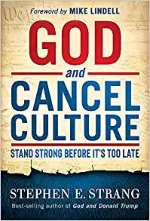Jews for Jesus Fights Back Against Today’s Cancel Culture
Antisemitism has reared its ugly head for centuries. Jewish people worldwide have been targeted and have been victims of this toxic persecution for longer than any care to remember.
But the cancel culture, about which I have written a new book, God and Cancel Culture , which releases Sept. 7, is a cancer that has stricken America only recently, perhaps over the last year and a half. While it may seem like the same form of persecution, cancel culture is a fairly new term.
My good friend, Susan Perlman, one of the co-founders of the Jews for Jesus who serves on the executive team of the organization, says even many Jews have become a part of it.
Because Jews for Jesus is a Messianic organization that tries to raise the awareness of Jesus as the Jewish Messiah, many in the Jewish community have either ignored this group or spoken out against it.
“It’s not the whole Jewish community, and we’ve always found a certain number of fair-minded Jews that are willing to consider the fact that we are legitimately Jewish,” Perlman says on a recent episode of the Strang Report podcast. “But oftentimes, there will be those within the Jewish leadership who will say, ‘You can be for Jesus; that’s your right, but don’t continue to call yourselves Jews.’ So they want to cancel out the Jewish part of our name. They say, ‘You can call yourself “Former Jews for Jesus,” but you are not really Jews anymore.’
“That’s one way cancel culture has hit us, and we’ve just basically refused to accept that depiction of who we are,” Perlman says. “We say, ‘If you want to call us bad Jews, call us bad Jews. Say that we’re misinformed, if that’s your opinion. But we are Jews; our parents are Jewish. We grew up as part of a people that God made a covenant with. We’ve never had God tell us that we’re no longer Jewish.’
“So, with that part of cancel culture, we’ve just been ornery about it,” she adds. “No. 1, we won’t accept that. No. 2, I think it’s important as believers for us to grasp the whole import of cancel culture and what repercussions that has on us sharing our faith and being strong believers. In this culture today, people just shrink away from saying things because they don’t want to be canceled out. They don’t want others to say, ‘We’re just writing you off; you have nothing to say that will be of interest to us.‘ Back in the first century, the apostle Paul would have been canceled out if cancel culture were big then. But I don’t think he would have stopped doing anything he did.”
Perlman points out that a recent survey came out from the Pew Research group on the Jewish population in the U.S., and the survey included Jews who are Jews by religion and Jews who are Jews with no religion, including atheists and agnostics. However, Pew made it very clear, Perlman said, that Jews who believe in Jesus would not be included in this Jewish study.
That’s yet another perfect example of the cancel culture.
“Yes, we were canceled by Pew for whatever reasons,” Perlman says. “But God hasn’t canceled us out and hasn’t canceled you out. Speak your voice and stand up for what God has given you to say.”
 For more information on how you can fight back against cancel culture, make sure to get a copy of what Charisma founder and CEO Stephen Strang says is his most important book yet. God and Cancel Culture releases Sept. 7, the day after Labor Day, wherever fine books are sold. Pre-order it at stevestrangbooks.com or on Amazon.
For more information on how you can fight back against cancel culture, make sure to get a copy of what Charisma founder and CEO Stephen Strang says is his most important book yet. God and Cancel Culture releases Sept. 7, the day after Labor Day, wherever fine books are sold. Pre-order it at stevestrangbooks.com or on Amazon.
Click here to listen to this entire podcast with Susan Perlman. Please spread the word about it to your followers on social media. Be sure to subscribe to the Strang Report on Apple Podcasts or your favorite podcast platform for more podcasts to inspire you to experience the power of the Holy Spirit. {eoa}
Read articles like this one and other Spirit-led content in our new platform, CHARISMA PLUS.















































